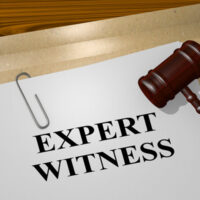When Is Expert Testimony Inadmissible In A Criminal Trial?

Expert witnesses provide context and analysis for jurors who are presumed to lack specialized knowledge in certain areas. Both the prosecution and the defendant may call expert witnesses in support of their case. But the judge has the final say on whether such witnesses are actually permitted to testify.
Under a rule known as the Daubert standard, a judge will only allow an expert to testify if three conditions are met:
- The witness’ proposed testimony is based on sufficient facts or data.
- The witness’ testimony is the product of reliable principles and methods.
- The witness applies those principles and methods reliably to the facts of the case.
Appeals Court: Judge Properly Excluded Defense Expert in Fraud Trial
A recent decision from the Florida First District Court of Appeal, May v. State, illustrates how judges apply the Daubert rule in practice. In this case, Florida prosecutors charged the defendant with fraud and racketeering. More precisely, the defendant was CEO of a charter school management company. The state alleged the defendant took kickbacks from another company that supplied equipment to the schools he managed.
The state called an expert witness at trial. This witness, a certified fraud examiner, offered testimony on how he traced the funds that were purportedly part of the defendant’s kickback scheme. The witness did not testify as to whether the defendant broke any laws; he simply showed what expenses were tied to which funds.
The defendant then sought to call his own expert witness in rebuttal. The prosecution objected. The defense expert was also a fraud examiner. This expert planned to testify that the analysis offered by the prosecution’s expert was flawed. The judge, however, decided to exclude the defense’s expert testimony due to “significant questions” about the witness’ qualifications and methodology.
Ultimately, the jury convicted the defendant of one count of fraud and two counts of racketeering. The judge sentenced the defendant to 20 years in prison. On appeal, the defendant raised a number of issues, including the trial judge’s decision to exclude his expert witness.
The First District upheld the defendant’s conviction. With respect to the issue of the excluded expert, the appellate court agreed the witness’ proposed testimony “did not use a reliable method.” The witness claimed he was using generally accepted accounting principles. But in fact, the First District said the witness “created his own method” involving a “reasonableness test” to classify certain expenses that the prosecution said were fraudulent. The problem was that the witness “never explained what this reasonableness test was or why it negated” the analysis offered by the prosecution’s expert.
Speak with a Florida Criminal Defense Attorney Today
If you are accused of a felony, it is important that you seek out legal representation from an experienced Tampa criminal defense lawyer who can advise you on issues like dealing with expert witnesses. Contact the Faulkner Law Group, PLLC, today to schedule an initial consultation with a member of our team.
Source:
1dca.org/content/download/780125/opinion/185153_DC05_08262021_140840_i.pdf
